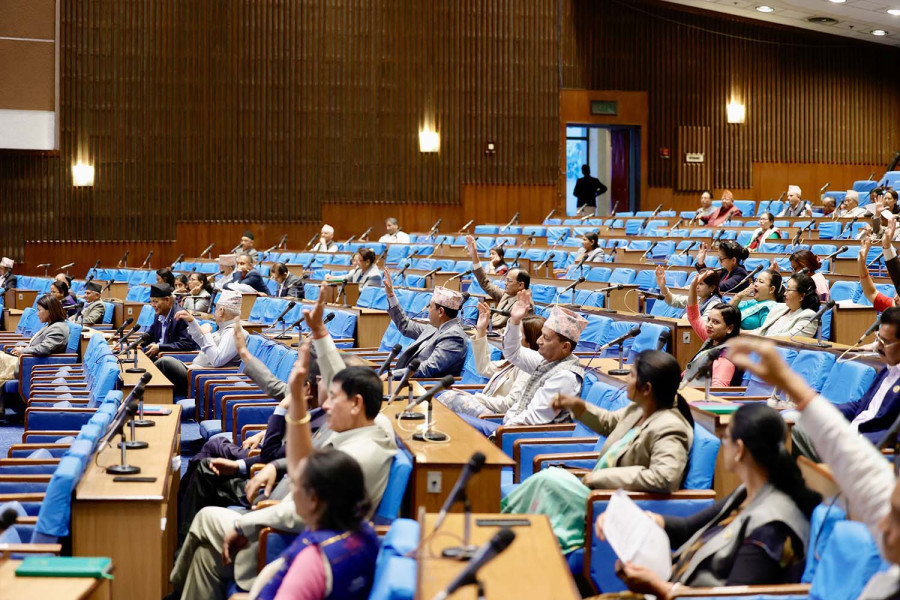Politics
House clears bill for civil service shake-up
Federal civil service bill retains two-year cooling-off period, raises retirement to 60. Provinces to appoint admin chief.
Binod Ghimire
The Federal Civil Service Bill, one of the laws essential for full implementation of federalism, has been endorsed by the House of Representatives amid reservations from a few fringe parties.
The bill, registered in Parliament for the second time after the promulgation of the Constitution of Nepal in March last year, got through the lower house following the backing of major parties.
“I consider the endorsement of the bill to be a historic and far-reaching policy milestone for a successful implementation of federalism,” said Speaker Devraj Ghimire, after the bill was passed by majority vote.
Smaller parties including the Nepal Majdoor Kisan Party and the Aam Janata Party, led by Prabhu Sah, objected to the bill claiming that it is discriminatory against local and underprivileged communities in recruitment, and unfriendly to local governments.
Though the bill was finalised by Parliament’s State Affairs and Good Governance Committee on May 17, pressure from the top bureaucrats to scrap provisions related to the cooling-off period after retirement delayed its endorsement by the lower house. Despite their lobbying, the House retained the provision while endorsing the bill.
If the bill is endorsed by the National Assembly without changes, which is highly likely, a civil servant who retires or resigns from the service will have to wait for two years before being appointed to any constitutional or diplomatic position. As it has been a common practice to appoint recently retired officials to constitutional positions, bureaucrats had lobbied for the provision to be scrapped.
The bill has also increased the retirement age of civil servants to 60 years, up from the existing 58. This provision, however, will be implemented gradually. The retirement age will continue to be 58 years until the fiscal year in which the bill is endorsed. It will then rise to 59 years and 60 years, respectively, in the succeeding fiscal years.
The erstwhile Pushpa Kamal Dahal government had registered the bill in the lower house on March 4 last year and it was forwarded to the House committee on May 28 after theoretical discussions. A total of 1,583 amendments were registered to the bill by lawmakers.
The bill envisions that the provincial civil service commissions will appoint chief administrative officers in local units under the respective provinces. However, until the provinces start their own recruitments, the federal government will depute such officers in bulk, and the provincial governments will assign them to local units. This arrangement can continue for a maximum of 10 years. Officers can be transferred between provinces once during their service period.
The bill places provincial secretaries under the respective provincial governments, thus meeting a longstanding demand of the provinces. However, for now, they will be deputed by the federal government. Provincial principal secretaries will continue to be under the federal government.
The bill also envisions reviving the additional secretary’s position in the civil service.
According to the bill, additional secretaries will be ranked above joint-secretaries and below secretaries. They will be on the 13th level of the civil service. Secretaries will be on the 14th level, and the chief secretary on the 15th. These three positions will fall under the gazetted special category.
Though there had been such a provision during the partyless Panchayat regime, it was removed after the restoration of democracy in 1990.
The bill has ended the provision of recruiting joint-secretaries through open competition. Once the law is enacted, the under-secretary will be the highest position available for lateral entry in the country’s bureaucracy. Gazetted third class (section officer) and non-gazetted first class will be the other entry points.
The bill has slightly revised the maximum age for entry in the civil service. While the entry age for men remains 35, it has been lowered to 39 from 40 years for women.
It has also lowered the tenure of secretaries to four years from five, and that of the chief secretary to two years from three.
Despite the demand to curtail trade unionism, the parties have decided not to do so. The parties faced intense pressure from the civil servants to give continuity to the unions.




 8.54°C Kathmandu
8.54°C Kathmandu














